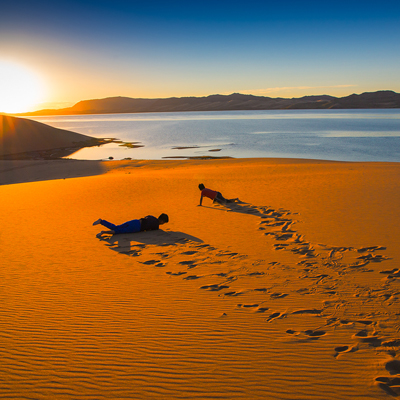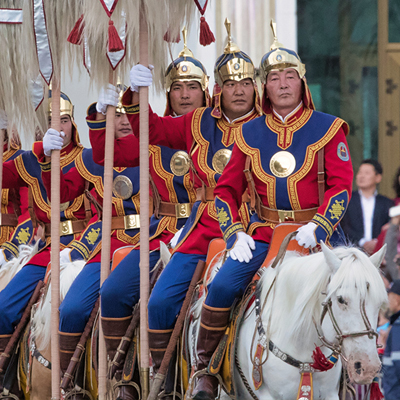Tsam Religious Festival and Golden Gobi-2025 Tour (Date to be announced later)
Explore beautiful Tsam, one of the Buddhist rituals, and its origination and development are inevitably connected with Buddhist devotees and nations. Tsam dances are truly awe-inspiring events. Tsam dancers meditate, pray, and softly chant while performing. Their dancing is a "meditation in action," creating sacred space with a particular felt mood or vibration, and is also an active prayer with a particular target. The word 'Tsam' means dance of the Buddha (deva) and elements of this dance show as if protectors and deities have physically descended on the Jambudtiva (Southern continent). In Mongolia, the tsam was introduced at the beginning of the 18th century from India through Tibet. For instance, the first tsam in Mongolia was performed in Erdene Zuu Monastery in 1786.
Highlights
- Religious event - Tsam dance
- Khongor Sand Dunes
- Bayanzag - Flaming cliffs
- Yol Valley of Gobi Gurvan Saikhan National Park
- Orkhon Valley and Kharkhorin, the ancient capital of the Mongol empire
Tour Itinerary
Day 1.
Transfer to the hotel and relax. City tour including the Gandan Monastery, the National Museum of Mongolia, which represents Mongolian Culture starting from the Stone Age to the 21st century, and Buddhism, Sukhbaatar Square (also known as Chingis Khaan Square). In Gandan Monastery, you can take local prayers, monks, the biggest standing indoor Buddha statue, and temples' own figure. (L/D)
.jpg)
Day 2.
This morning, we leave early to the famous Amarbayasgalant Monastery. Excursion through the monastery, located at the foot of Burenkhaan mountain, Amarbayasgalant or "Monastery of Tranquil Felicity”, is one of the largest and most important monasteries in Mongolia. Built between 1727 and 1736 with more than 40 temples in honor of Zanabazar, the first Bogd Gegeen (Spiritual leader of Mongolian Buddhism), it is one of the very few monasteries to have partly escaped the destruction of 1937, after which only the buildings of the central section remained. The entire contents: the Tankas, statues, and manuscripts were looted by the Communists or hidden until more fortunate times. Restoration work began in 1988 and now the Amarbayasgalant monastery shows great stylistic unity. (B/L/D)
.jpg)
Day 3.
Tsam festival day in Amarbayasgalant monastery. Tsam is one of the Buddhist rituals and its origination and development are inevitably connected with Buddhist devotees and nations. Tsam dances are truly awe-inspiring events and 108 dancers meditate, pray, and softly chant while performing. (B/L/D)
.jpg)
Day 4.
On the way, we will pass Erdenet city, the third-largest city in Mongolia, which is located in the northern part of the country. The city was built in 1975 to exploit Asia's largest deposit of copper ore and has the fourth largest copper mine in the world. The "Erdenet Mining Corporation" is a joint Mongolian-Russian venture. Stay overnight with a nomadic family in the countryside of Bulgan province. (B/L/D)
Day 5.
Head to Ugii Lake in the morning. The road is smoothly paved, and for the last 90 km, we drive on a dirt road, which leads to the lake. Ugii Lake is a wonderful place to have to relax after long driving. The lake has an abundant birdlife of more than 150 bird species. Bird watching, fishing is parts of the available entertainment. We will visit a local family, exploring their nomadic lifestyle and livestock farming. Getting the first experience of a Mongolian ger. (B/L/D)
.jpg)
Day 6.
Drive to Kharkhorin, the ancient capital of Mongolia at the time of the Mongol Empire. There’s almost nothing left from this great capital of the world, but in 1586, under the rule of King Avtai Sain, the Erdene-Zuu Monastery was built at the site of the ruins of ancient Kharkhorin. The Erdene-Zuu – means Hundred of Treasures was again destroyed during the Stalinist purges of the 1930s, but there are still various Buddhist statues, works of art, religious instruments, and even Tsam religious dance masks at the monastery. There are an amazing 108 stupas surrounding the monastery. (B/L/D)
.jpg)
Day 7.
Drive to the south towards the Gobi Desert. Overnight stop at Ongi River and Saikhan ovoo area of Middle Gobi province. Ongi Monastery, a small mountainous area with the sites of remains of ruined old monasteries. Once the monastery has served as a midway point for Buddhist pilgrimages going to holy Tibet. Enjoy the sunset from the top of the mountain. (B/L/D)
.jpg)
Day 8.
Drive towards Bayanzag, red stone cliffs and canyons- the classic desert of rock, red sands, scrub, sun and, unbelievable emptiness has become known to the world as "Cemetery of Dinosaurs”. The red sandstone cliffs and canyons of Bayanzag are where the fossil beds of dinosaur bones and first-ever recorded dinosaur eggs in 1922 - discoveries which made world headlines by American paleontologist Roy Chapman Andrews first time. Nowadays there is a local museum which displays important facts and some exhibits of this famous area. (B/L/D)
.jpg)
Day 9.
Drive to Khongor Sand Dunes - the largest and most spectacular sand dunes in Mongolia. The sand dunes of Khongor are known as the « singing dunes » and they extend for 180 km and at some places they are 80m high. These spectacular dunes are bordered by lush green vegetation supported by a small river Khongor. Walking and Sliding at the dunes before the sunset and meditate in the middle of nowhere. Visit camel breeding family and get some experience with camel riding. (B/L/D)
.jpg)
Day 10.
Discover beautiful Yoliin Am Valley or Yol Valley (translates to Lammergeier Valley), which is formatted by two high rock walls a big glacier on the ground kept frozen during hot summer days. It has breathtaking dramatic scenery and without a doubt is one of the beautiful places in the country.
The Gobi Gurvan Saikhan National Park is rich in fauna. There are mountain sheep, goats, leopards, black-tailed marten of cliffs, lynx, wildcats, squirrels, white gazelles, and other mammal animals. Hiking around the national park to explore its beauty. Visit the natural museum of localities. (B/L/D)
.jpg)
Day 11.
Take a flight back to Ulaanbaatar. Visit the Winter Palace of Bogd Khan Museum, where the last monarch of Mongolia lived in the first half of the 20th century. Amazing performance of traditional dance and folk in the evening. After that, farewell dinner together. (B/L/D)
.jpg)
Day 12.
Transfer to Chinggis Khaan International Airport or Train station and depart Mongolia. (B)
Prices & Inclusions
| Group size | Price/Per person |
| 2 PAX | 2350$ |
| 3-4 pax | 2150$ |
| 5-8 PAX | 2050$ |
| 9-12 PAX | 1950$ |
| 13-15 PAX | 1890$ |
Includes
Accommodation: Hotel****,* ger camp
Guiding and interpreting service
Full board meals
Transport: 4x4 vehicle or minivan
Entrance fees to protected areas and national parks
Museums and cultural performance
Camping Equipments
Camel riding
Not Includes
International airfare
Personal equipment
Optional activity cost
Excess baggage charges
Single room supplement
Alcoholic drinks
Travel Insurance
The extra cost for photography in museums
Tip for a tour guide, driver, etc










.jpg)





















